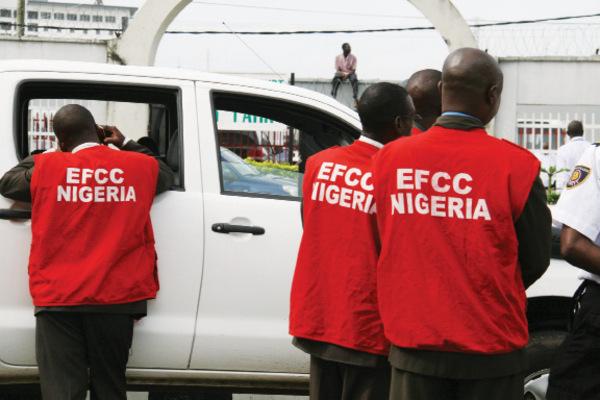- Rivers Govt Kicks as EFCC Probes N117b Transactions
Detectives are probing about N117b suspicious transactions by the government of Rivers State in the last three years.
The huge cash was intermittently withdrawn over the counter by a state official designated for the purpose, Economic and Financial Crimes Commission (EFCC) sources said at the weekend.
There were indications that the withdrawals from the state accounts were laundered by some state officials.
The state government yesterday described the probe as a “political witch-hunt” and vowed not to be intimidated.
Four suspects have been shortlisted for interrogation in connection with the massive withdrawals. They include an official in charge of Finance and Accounts at the Government House in Port Harcourt and a cashier.
The EFCC has detained a bank’s Managing Director (MD), who admitted that N5.2billion was realised as charges for the “controversial” transactions.
According to the sources, the withdrawals were made in tranches of N10million with as many as 50 cheques cashed in a day.
The sources said it was a case of “gross violation” of the Money Laundering (Prohibition) Act of 2011.
One of the sources said: “Based on intelligence report, the EFCC swung into action.
“Our findings indicated that the withdrawals were made in cash from the state accounts mostly by one person. There are no records of what the cash was used for. We are working on clues that it was diverted.
“The EFCC team has obtained all the records of the withdrawals, including date and time. For instance, on June 8, 2015 barely few days in government, about 45 cheques amounting to N450million were cashed over the counter for no justifiable purpose.
“Also, on June 9, 2015 about 50 cheques amounting to N500million were withdrawn. We will soon release the details of findings by our team.”
Another source spoke of how a bank chief was quizzed last Thursday and released on administrative bail.
“But he was asked to come back on Friday and we have been interacting with him up till Sunday. He admitted that all the withdrawals were made over the counter in cash.
“He also said the bank benefited about N5.2billion from the charges collected on the transactions,” the source said.
Another source said the bank was guilty of “lack of Suspicious Transaction Report(STR)” and violation of Money Laundering (Prohibition) Act 2011, especially sections on special surveillance on certain transactions and Limitation to make or accept cash payment.
The Act reads: “Special surveillance on certain transactions.
“6. (1) Where a transaction –
(a) involves a frequency which is unjustifiable or unreasonable;
(b) is surrounded by conditions of unusual or unjustified complexity;
(c) appears to have no economic justification or lawful objective; or
(d) in the opinion of the Financial Institution or Designated Non-Financial Institution involves terrorist financing or is inconsistent with the known transaction pattern of the account or business relationship, that transaction shall be deemed to be suspicious and the Financial Institution involved in such transaction shall seek information from the customer as to the origin and destination of the fund, the aim of the transaction and the identity of the beneficiary.
(2) A Financial Institution or Designated Non-Financial Institution shall within 7 days after the transaction referred to in subsection (1) of this section –
(a) draw up a written report containing all relevant information on the matters mentioned in subsection (1) of this section together with the identity of the principal and where applicable, of the beneficiary or beneficiaries;
(b) take appropriate action to prevent the laundering of the proceeds of a crime or an illegal act; and
(c) send a copy of the report and action taken to the Commission.
(3) The provisions of subsections (1) and (2) of this section shall apply whether the transaction is completed or not.
(4) The Commission shall acknowledge receipt of any disclosure, report or information received under this section and may demand such additional information as it may deem necessary.
(5)(a) The acknowledgement of receipt shall be sent to the Financial Institution or Designated Non-Financial Institution within the time allowed for the transaction to be undertaken and it may be accompanied by a notice deferring the transaction for a period not exceeding 72 hours.
(b) Notwithstanding the provisions of paragraph (a) of this subsection, the Chairman of the Commission, the Governor of the Central Bank or their authorized representative shall place a Stop Order not exceeding 72 hours, on any account or transaction if it is discovered in the course of their duties that such account or transaction is suspected to be involved in any crime.
(6) If the acknowledgement of receipt is not accompanied by a stop notice, or where the stop notice has expired and the order specified in subsection (7) of this section to block the transaction has not reached the Financial Institution or Designated Non-Financial Institution, it may carry out the transaction.
(7) Where it is not possible to ascertain the origin of the funds within the period of stoppage of the transaction, The Federal High Court may, at the request of the commission, or others persons of authority duly authorized in that behalf, order that that the funds, accounts or securities referred to in the report be blocked.
(8) An order made by the Federal High Court under subsection (7) of this section shall be enforced forthwith.


 Forex3 weeks ago
Forex3 weeks ago


 Naira2 weeks ago
Naira2 weeks ago
 Billionaire Watch2 weeks ago
Billionaire Watch2 weeks ago




 Naira2 weeks ago
Naira2 weeks ago




 Naira2 weeks ago
Naira2 weeks ago




 Naira1 week ago
Naira1 week ago




 Naira4 weeks ago
Naira4 weeks ago




 Naira3 weeks ago
Naira3 weeks ago





















